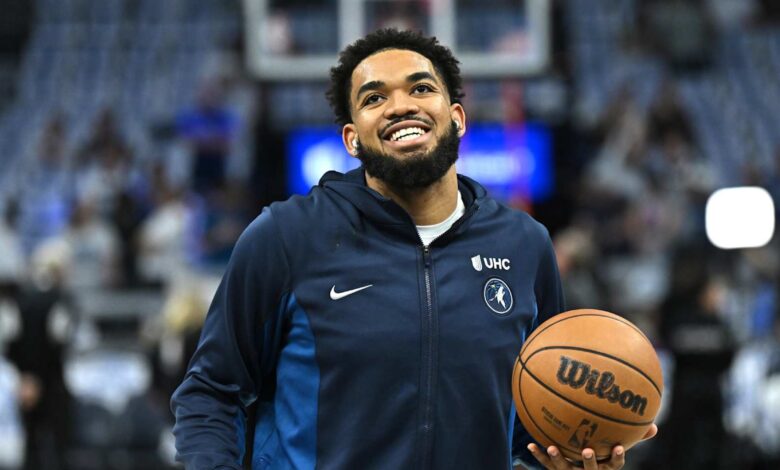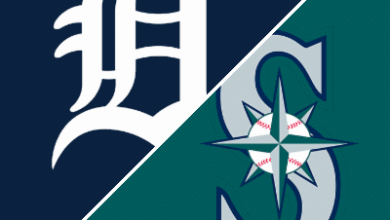Grading Knicks-Timberwolves Trade That Swaps Karl-Anthony Towns, Julius Randle

Grading Knicks-Timberwolves Trade That Swaps Karl-Anthony Towns, Julius Randle
0 of 3

Nathaniel S. Butler/NBAE via Getty Images
There is never a dull moment in the NBA. Not even late September, typically the doldrums of the league’s offseason, is safe from unexpected fireworks.
Late Friday night, while fans were likely enjoying anything but basketball, The Athletic’s Shams Charania reported a blockbuster trade sending Karl-Anthony Towns to the New York Knicks and Julius Randle and Donte DiVincenzo to the Minnesota Timberwolves.
Shams Charania @ShamsCharania
Knicks have acquired Karl-Anthony Towns from Minnesota for Julius Randle, Donte DiVincenzo and a first-round pick via Detroit, sources tell me and @JonKrawczynski. pic.twitter.com/FafQlY48Y1
Charania later reported that DaQuan Jeffries and draft compensation would be headed to the Charlotte Hornets, expanding the deal to a three-teamer.
It’s a fascinating trade that moves players who are no strangers to rumors, but the timing and final framework were still shocking.
Knicks: A-
1 of 3

Nathaniel S. Butler/NBAE via Getty Images
After losing Isaiah Hartenstein to free agency and Mitchell Robinson (at least for the start of the season) to injury, the Knicks were in dire need of a center. Unclogging a forward rotation that includes Mikal Bridges and OG Anunoby would be nice, too.
Friday, New York checked both those boxes, while adding an All-Star in the process.
Towns feels like a near perfect No. 2 option alongside Jalen Brunson. The diminutive guard thrives in getting through tight spaces and into the paint, and Towns’ shooting will make that even easier for him.
The self-proclaimed best shooting big of all time really is a dynamic weapon from beyond the arc. Since the start of the 2017-18 campaign, he’s hit 40.4 percent of his threes, while attempting 5.1 per game. Opposing centers are forced to follow him to the perimeter, or he’ll pour in points from the outside. That, of course, will leave the paint exposed for Brunson, Bridges, Anunoby and Josh Hart to attack.
Randle is better than Towns at creating offense from scratch. Losing one-fourth of the ‘Nova Knicks in DiVincenzo is tough on a sentimental level and also hurts New York’s depth. Towns certainly isn’t the kind of rim protector the Knicks had with Hartenstein or Robinson.
But KAT will supercharge an already strong offense. Miles McBride is ready for a bigger role in DiVincenzo’s absence. And New York has two of the league’s best three-and-D forwards in Bridges and Anunoby to make Towns’ job easier on defense.
There is a potential drawback down the line. Even with the salary cap rising in the coming years, $61 million for Towns in his age-32 season could be a tough pill to swallow. Brunson taking a below-market contract this summer helps to absorb KAT’s mega-contract in the short term, but there’s certainly a little less cap flexibility in New York than there was before the deal.
Still, the Knicks are potentially looking at an open title window. Paying for stars is what you have to do at this phase of team-building.
Timberwolves: C+
2 of 3

David Berding/Getty Images
This is a tougher deal to read from Minnesota’s perspective.
Yes, there were early fit issues with KAT and Rudy Gobert, but those had subsided during the 2023-24 campaign. Last regular and postseason, Minnesota dominated when both were on the floor.
That was largely due to Towns’ shooting, which Randle simply cannot reproduce. He’s a career 33.3 percent three-point shooter who will undoubtedly be dared to chuck away by playoff defenses. That will make things more cramped for a Timberwolves starting five that includes Gobert and Anthony Edwards. The latter is developing as a three-point threat, but it’d sure be nice to keep the middle of the floor open for his slashing, too.
Towns was no Dikembe Mutombo, but he and Gobert made up a massive front line that caused real problems for the 2022-23 champion Denver Nuggets. Naz Reid can replicate that to a degree, but there’s no doubt Minnesota is now slightly less equipped to bother the league’s best player, Nikola Jokić.
Still, the Wolves don’t get a failing grade here. Randle can take some pressure off Mike Conley and Edwards as a playmaker. DiVincenzo is one of the league’s best rebounding guards, a pesky defender and might even be a sneaky Sixth Man of the Year candidate in this role.
There’s also the flexibility that comes from unloading Towns’ contract, which runs through 2027-28 (when he has that $61 million player option). Randle makes $28.9 million this year and has a player option for $30.9 million next season. If he doesn’t work out, he could either leave in free agency, or Minnesota could deal his manageable salary.
There’s also the pick New York is sending to the Wolves in this trade. It’s a first from the perpetually bad Detroit Pistons and is top-13 protected in 2025. It probably won’t convey this summer, but there are two more chances for that to be an extra first for Minnesota (it’s top-11 protected in 2026, top-nine protected in 2027 and would become a second-rounder if it never conveys as a first).
There are positives to sell here, but Minnesota just made the Conference Finals for the first time since 2004. It has a rising superstar in Edwards, who should be at the heart of the Wolves’ thinking on every move. And the often ball-dominant Randle, with his shaky jump shot, doesn’t seem like the kind of player who’ll maximize what’s happening with Ant in 2024-25.
Hornets: A
3 of 3

Jared C. Tilton/Getty Images
This is exactly the kind of move a rebuilding team should be trying to jump in on.
All we know about Charlotte’s return, for now, is that Jeffries and draft compensation is headed its way, but it’s safe to assume the Hornets aren’t giving up a ton to facilitate this.
Under the collective bargaining agreement, the primary teams in a trade sometimes need a dumping ground. For now, Charlotte is exactly that kind of dumping ground.
If Jeffries, a 27-year-old wing with a career average of 3.0 points and a 28.1 three-point percentage, proves better than expected or the future pick turns into a rotation player, wonderful.
If not, Charlotte didn’t risk much (if anything) to get the extra shots.



